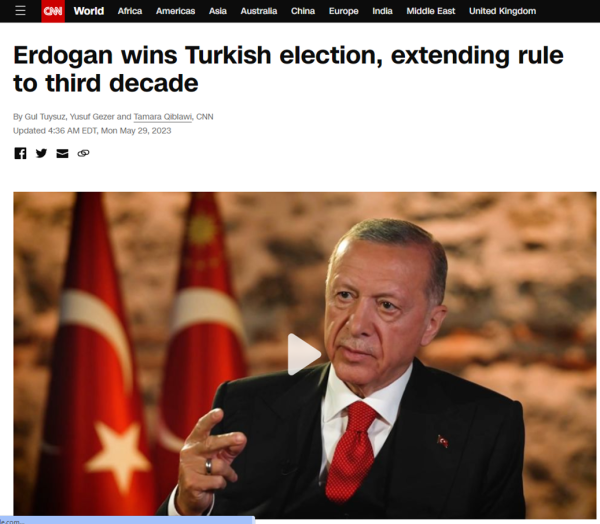If you would like to receive weekly updates like this, sign up here.
As I watched the newsfeed providing me with up-to-date election advice, I was nervous.
Because I was acutely aware of the importance of this election.
However, as the day wore on it became clear who the winner would be. And with that, my own hopes for some semblance of light at the end of the tunnel dissipated.
You might be thinking right now I’m speaking of last year’s Australian elections? Actually no, I’m speaking about the May 14th elections in Turkey.

Source – CNN
Now, you might be a fan of geopolitics, or you may not be. The decision made by Turkish voters may be important to you, or not.
Of course, not a single Australian based news media really picked up on this historic vote.
My contention though is this; it IS important. I know you read this newsletter each week because like me you share a desire or passion to be in the thick of the action when it comes to the real estate cycle.
And the reason why you need to know about this election result is this.
It could have marked the end of a disturbing and growing worldwide trend. The rise of the autocratic strongman. What it’s done instead is locked in an even worse bust than even I imagined could occur later this decade.
And in today’s newsletter I’m going to explain to you why that is.
With luck, you will end up realising just how much the odds are stacked against you and your family of surviving unscathed by the actions of these gentleman.
And discuss one of the few things you can do to protect yourself.
Revisionist history is not your friend.
It won’t surprise to learn that as a keen student of the 18.6-year Real Estate Cycle, I am avid reader of history.
When you can view human affairs over a long span of time you inevitably conclude that we human beings repeat a lot of behaviour over and over, even if we don’t realise it at the time.
When I was at university, I spent several terms studying the works of Plato, the ancient Greek philosopher.
Plato also was a keen observer of patterns in human history, albeit that he presented his views in philosophical terms. One of his most important works was The Republic. In it he described his vision for the ideal city state and the way to educate the best political leaders.
Some of his ideas might seem strange to a modern reader. Fair enough. But one part of this work has a very modern ring to it. Towards the end of The Republic, he describes the (for him, inevitable) dissolution of a democratic system of government into autocracy.
Bear with me while I briefly cover his arguments. Because they are relevant to where we are in the cycle and what’s happening around us presently.
One feature of democratic government is that there tends to be a lot of conflict between different factions of people.
We can certainly relate to that.
Over time, Plato argued, and depending on how such conflict plays out, it’s often the case that a section of the population feels under-represented and discontented.
When this persists over a significant period of time, they’re open to a strong leader coming along to tell the masses that they fell their pain and can provide all the answers to make things better.
That leader will gain prominence by feeding off (and indeed fuelling) this discontent. They must cast other groups in society as the enemy.
They foment division in society to gain power. And once installed they need to find a way to stay in power. This means ruling autocratically, crushing opposition, by force if necessary, and undermining political institutions.
This is how democracy ends in tyranny, according to Plato.
Is this relevant to some of the things going on in the world today? I think so. And it will affect how things play out in the remainder of the cycle.

You’ll have seen it in various places that we live in the era of the “strongman” leader.
Strongmen leaders are those who exhibit autocratic tendencies, even if they are democratically elected. They don’t deal with dissent and so crush press freedoms and opposition parties.
A bit like the tyrants of Plato’s Republic.
I was reminded of this over the weekend when the election of the Turkish president, Recep Tayyip Erdogan, was confirmed. He is a very much a strongman leader in this era, relying on the support of conservative, religious political base outside most of the main cities.
I won’t go into all the ways in which Erdogan has changed the direction of Turkey in the past decade. There’s plenty written about it already.
I am more interested in what he represents and how it affects the cycle, because he’s not the only such leader. There are many such leaders around. We have seen many examples, Xi, Trump, Johnson, Modi, Bolsonaro, Putin.
One of the key “reforms” introduced by such leaders is to remove limits to their time in power.
The presidents of China and Russia are effectively leaders for life. The constitutions in both countries had term limits when both originally came to power.
But over the years, they have demolished opposition and had the constitutions changed. They will choose the moment they relinquish power.
Erdogan himself is now beginning his third decade in power.
Why is this important? Well, the longer a leader is in power the worse their decision-making becomes.
It must be so.
None so blind as those who cannot see.
Leaders in any walk of life, but particularly political leaders, rely on good advice.
But when working for someone who is in power for life, advisors come to realise that telling them the truth – including bad news – is not the way to achieve career advancement.
In fact, telling them what they don’t want to hear might even be hazardous to your health.
And if they are going to be in power for an indefinite amount of time, you can’t simply wait them out and hope a new leader will arrive.
Also, this is particularly true with autocrats, because so much of their political career is based on the idea that they have the solutions to the world’s problems and their ideas are the right ones.
How can they condone anyone telling them that they are wrong? It wrecks their entire claim to power – that they alone know what to do.
As they cannot be surrounded by advisors who are telling them exactly how things are they eventually get surrounded by people who tell them only what they want to hear.
Simon Kuper, writing in the Financial Times, made this observation about the Soviet leadership in the 1960s:
If the intelligence service gave information that didn’t match the boss’s views, then either that information wasn’t passed on, or it was changed so that it did match the boss’s view. So, he was never correctly informed.
But this equally applies to the strongmen of today. Turkey’s economic policy is a mess. Putin has probably not received any objective advice on what to do in Ukraine.
And as there are many such strongmen leaders around now, it does not bode well for the
final years of the 18.6-year Real Estate Cycle.
As things go over the top, as leverage builds up, as the system becomes more vulnerable to a shock, such leaders are not going to get the information they need to make better decisions.
In fact, quite the opposite.
This applies to some of the world’s largest countries, such as Russia, China, and perhaps even India. They are all vulnerable to this problem.
And as the cycle is now a global one, it’s a problem for us also. It doesn’t bode well for the prospect of avoiding a crisis when the time comes.
What about America?
Well, imagine – as seems quite possible – that Trump wins the next election in the United States next year. We know from his first term in office that he’s not exactly open to canvassing a wide range of views.
He’s even a real estate man. Do you think anyone in his staff will want to tell him that his own administration’s policies are driving real estate prices to unsustainable levels that could collapse in a major crash?
Hardly.
He’ll want to hear how well things are going and that he is responsible for the big boom that is making everyone wealthy.
This explains the significance of Erdogan’s win. It’s evidence that the era of the strongman is still alive and well.
And therefore, it suggests that once again most leaders will be wilfully blind to what will come next when the cycle turns down.
In this environment, you’re going to need alternative sources of information to manage your own affairs.
Here’s how we can help you, via a membership to the Boom Bust Bulletin (BBB). Give me the opportunity to take you in depth into the cycle.
Learn about the over 200-year history of the 18.6-year Real Estate Cycle and why even today it continues to repeat like clockwork.
It will teach you how to decipher the news that we get bombarded with every day to focus solely on what truly matters.
No more negativity and noise, just the science of the economic rent and the timing inherent in the real estate cycle.
This is all you need to succeed.
There is no getting around the fact that today, you have so little trusted sources you can turn to when things get emotionally charged during the peak then bust phase of the real estate cycle.
You simply won’t get the type of information you need, at the right time, if your strategy is to rely upon the government to have your best interest at heart.
You must hold an edge over most investors out there if you want to stand any chance of holding on to what you achieved during the boom years. Let alone successfully navigating the inevitable bust.
That’s how the BBB can help.
As a Boom Bust Bulletin member you will receive 12 monthly editions a year detailing all the key turning points of the cycle, a deep dive into the most important markets across the globe and ways that you can personally benefit from this knowledge.
All derived from our unique and proprietary research – which you’ll not find anywhere else.
Plus, you’ll receive exclusive invites to BBB member-only webinars when we run them.
All this for just US $4 a month, less than a takeaway coffee.
Best wishes,

Darren J Wilson
and your Property Sharemarket Economics Team
P.S. – If you would like to receive weekly updates like this, sign up here.
P.P.S – Find us on Twitter here and go to our Facebook page here.
This content is not personal or general advice. If you are in doubt as to how to apply or even should be applying the content in this document to your own personal situation, we recommend you seek professional financial advice. Feel free to forward this email to any other person whom you think should read it.



